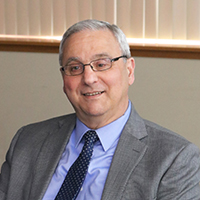Equal Partnerships, Positive Outcomes

For Bill Carbone, MPA, partnering with statewide non-profits has always been an essential part of maintaining youth and adults safely in the community. As former executive director of the State of Connecticut Judicial Branch, Court Support Services Division (CSSD), Mr. Carbone worked with Wheeler for many years until his retirement from state government in 2014.
Mr. Carbone said that CSSD and Wheeler forged a relationship in the 1990s when the State of Connecticut made a significant investment in alternatives to incarceration for adult and juvenile offenders.
“At that time, CSSD approached the non-profit community to be partners in this effort,” remembered Mr. Carbone. “Who better to collaborate with than well-established, deep-rooted organizations with a history of working with people in the local community?
“Half of our work depended on our ties with non-profit organizations, without which we couldn’t accomplish the goal of transforming individuals from law-breaking to law-abiding,” he added.
For nearly two decades, CSSD has funded an array of programs delivered by Wheeler, including Wheeler’s Alternative in the Community program, which offers community-based intervention services for adults involved with the court or probation. Other CSSD-funded programs include services for individuals and families affected by domestic violence, as well as pre-trial drug and alcohol education, in-home and community-based family therapy programs and more.
“The vision was [and still is] to foster greater safety in our cities and towns and prevent individuals from committing new crimes,” said Mr. Carbone. “Part of the solution is to provide support to individuals who depend on help from organizations like Wheeler.”
Mr. Carbone said that as the CSSD-Wheeler partnership deepened, both organizations discovered their shared passion for—and commitment to—demonstrated outcomes.
“I strongly believe in data-driven policy making and really appreciated the fact that Wheeler was equally interested in data, which put the organization in a category by itself,” said Mr. Carbone. “Wheeler is professional, clinical and different in its approach, with the ability to adjust service delivery based on what the research says.”
This approach has led to continued programmatic expansion for Wheeler in many areas of the organization, including community justice services.
Now a Senior Lecturer and Executive Director of Justice Programs at the University of New Haven’s Henry C. Lee College of Criminal Justice & Forensic Sciences, Mr. Carbone shares with graduate students many lessons from public life. Among the most notable, “Creating safer communities is a multi-pronged effort that involves a close working relationship between government and non-profits,” he said. “The partnership is truly a 50/50 arrangement.”






